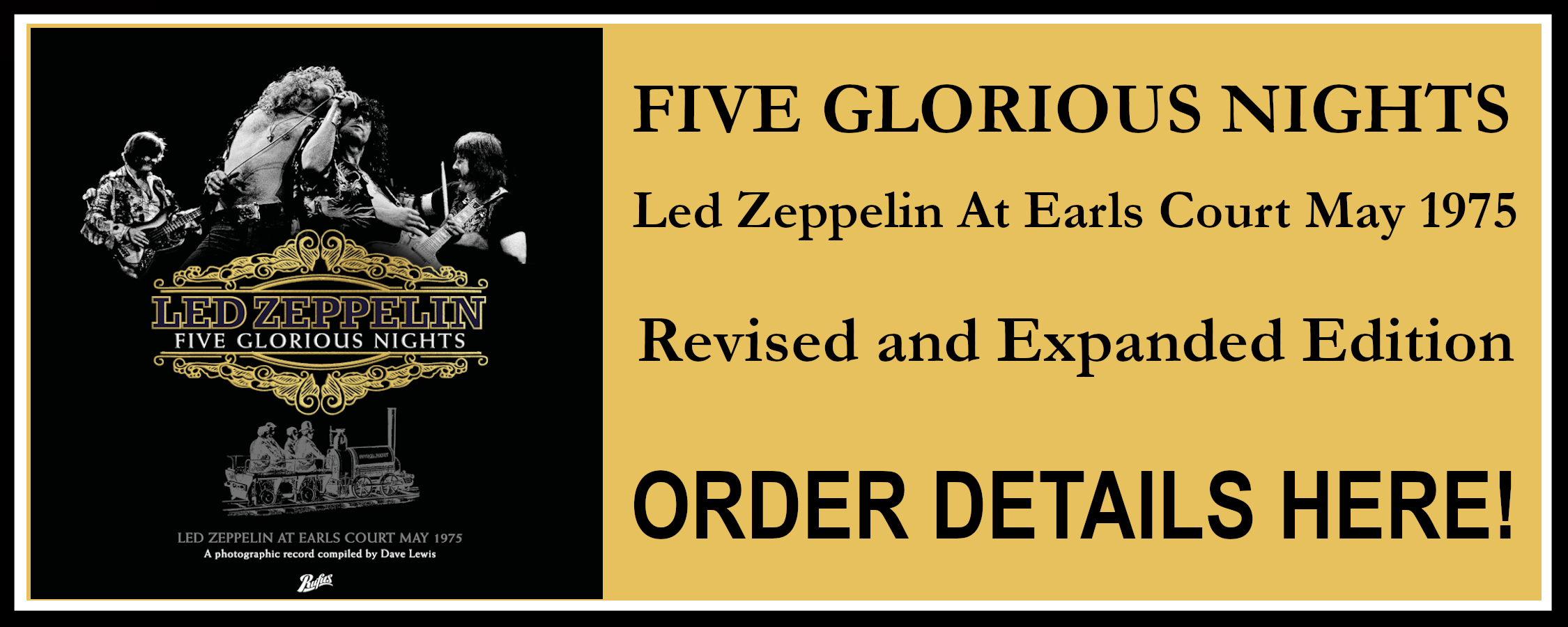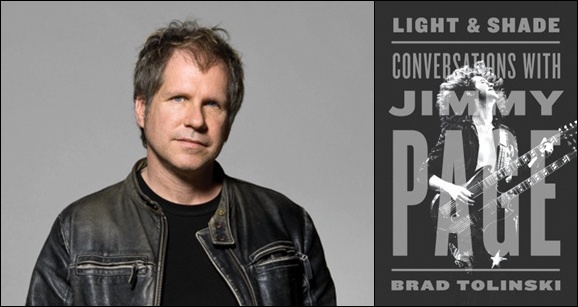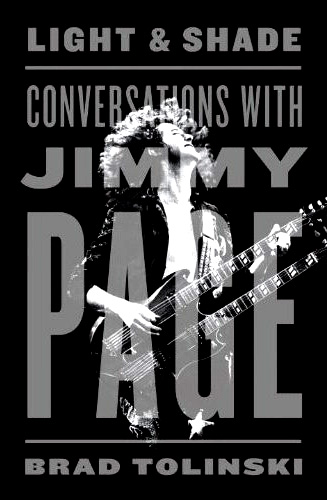BRAD TOLINSKI – LIGHT & SHADE: CONVERSATIONS WITH JIMMY PAGE BOOK REVIEW AND YOUR CHANCE TO WIN A COPY IN AN EXCLUSIVE TBL COMPETITION
LIGHT & SHADE OFFERS CLARITY AND PERCEPTION
Light & Shade – Conversations with Jimmy Page by Brad Tolinski
I have long since been an admirer of Brad Tolinksi’s Jimmy Page features in Guitar World magzine. As can be seen above, I’ve been an avid collector of these issues over the past 20 years. They have made for some of the most illuminating interviews Jimmy has conducted in the post Zeppelin years.
Brad has always show much empathy for the subject coming in from the angle of a real fan and enthusiast of the music rather than some jobbing hack.
This introduction by Brad to one of the Guitar World Page specials in 1993 captures that empathy perfectly.
‘’Led Zeppelin were the best because they were the most exotic and imaginative of rock bands. And the fascination with the group continues because their music still sounds strange, wild and totally alien today as it did two decades ago. Led Zeppelin music was designed to stimulate the imagination, to encourage kids to dream ,to see an open space beyond the grind of daily existence’’
It’s more than evident that Brad’s knowledge for his subject endeared him to Jimmy during their conversations. From an initial encounter in 1993 to discuss the Coverdale Page album, Brad has gone on to interview Jimmy on a number of occasions clocking up some 50 hours of taped conversations.
This is the main source for a welcomed new addition to the Zep bookshelf – Light & Shade -Conversations with Jimmy Page. Brad interweaves his original Guitar World interviews to form a chronological Page history – with much of the story coming from the guitarist himself. It’s refreshing to read a book that offers a purely positive musical angle on the story.
Jimmy is particularly enlightening on talking about the early Zep albums from an interview conducted in 1993 when Boxed Set 2 and the Complete Studio Recordings set appeared and on the techniques used to record their BBC sessions. Another highlight is the conversation with Jeff Beck where they both muse over their blue roots and early careers. Extensive retrospective overviews on the Led Zep III and Led Zep IV pave the way for later similar focus on The Song Remains The Same movie and the 2003 DVD. As with any book signed off before the announcement of the Celebration Day film, the text lacks Page’s current view on the 02 reunion show but that could well be rectified in a future edition should Brad catch up with Jimmy again.
Linking pieces by various players in the story such as Yardbird Chris Dreja, Paul Rodgers, record exec Danny Goldberg and John Paul Jones compliments the master’s words more than adequately.
There are also interlude pieces on the ten greatest Led Zeppelin guitar moments, a round up of his guitar gear, Page fashion notes by John Varvatos and an astrology dissection but the real meat of the book is the presentation of the gospel according to the man who made the music. In providing Jimmy Page a platform to explain how he did all that, Brad Tolinksi’s Light & Shade brings both clarity and perception to its subject
Dave Lewis, November 2st 2012.
The book is available via Crown Publishing in the US and Virgin Books/Random House in the UK
Order at these links:
UK:
US:
http://www.barnesandnoble.com/w/light-and-shade-brad-tolinski/1110994409?ean=9780307985712
EXCLUSIVE TBL COMPETITON!
Your chance to win a copy of the Brad Tolinksi book Light & Shade – Conversations with Jimmy Page
We have 5 copies of the book to give out in an easy to enter competition.
All you have to do is answer this question correctly:
What was the name of Jimmy Page’s first ever solo single released in 1965?
The first five all correct entries drawn out will each receive a copy of the Brad Tolinksi Light & Shade book.
Email your entries to the usual email:
Closing date is Monday November 19th, 2012. Winning entrants will be informed.
FINALLY…HERE’S AN EXTRACT FROM THE BOOK:
Brad Tolinski, editorial director of Guitar World, Revolver and Guitar Aficionado magazines, has interviewed Jimmy Page more than any other journalist in the world.
Those interviews have led to his new book, Light & Shade: Conversations With Jimmy Page, which was published today, October 23, by Crown Publishing.
Light & Shade is drawn from the best of more than 50 hours worth of conversations that touch on everything from the music scene of the ’60s; Page’s early years as England’s top session guitarist working with The Who, The Kinks and Eric Clapton; his time with The Yardbirds and Led Zeppelin and his post-Zep projects. The book provides readers with the most complete picture of the media-shy guitarist ever published.
Below is an excerpt from the book, where Page discusses the work that went into recording Led Zeppelin’s self-titled 1969 debut album. For another excerpt that focuses on Page’s time in The Yardbirds, check out the December 2012 issue of Guitar World. It’s available on newsstands now and at the Guitar World Online Store.
“I WANTED ARTISTIC CONTROL IN A VISE GRIP…”
Page leaves the Yardbirds, forms Led Zeppelin and records their first two albums.
BRAD TOLINSKI: Right from the beginning, you were able to translate the extreme dynamism of Led Zeppelin’s live act into a dynamic studio recording: What was your secret?
JIMMY PAGE: That is interesting, isn’t it? One usually thinks of a dynamic album being translated into a dynamic live performance, but in the early days, it was the other way around for us.
I think part of the key was that we miked John Bonham’s drums like a proper acoustic instrument in a good acoustic environment. The drums had to sound good because they were going to be the backbone of the band. So I worked hard on microphone placement. But then again, you see, when you have someone who is as powerful as John Bonham going for you, the battle is all but won.
So the way to capture a dynamic performance is, essentially, to capture the natural sound of the instruments.
PAGE: Sure. You shouldn’t really have to use EQ in the studio if the instruments sound good. It should all be done with microphones and microphone placement. The instruments that bleed into each other are what creates the ambience. Once you start cleaning everything up, you lose it. You lose that sort of halo that bleeding creates. Then if you eliminate the halo, you have to go back and put in some artificial reverb, which is never as good.
That’s particularly true of the blues. Playing the blues is not a cerebral experience. Its often said that musicians try to summon the spirit of the blues when they play. But how can that be done when there is no room, no space? And space is also essential if If you want to capture the mojo created by musicians playing together, live.
PAGE: And that’s probably the biggest difference between the music made in the Fifties and music made from the Seventies on—everything suddenly had to be cleaned up. You do that and you take that whole punch out of the track.
Along with that strong musical vision you had in those early days, you also took a unique approach to handling the business aspect of the band. By producing the first album and tour yourself, was it your intention to keep record company interference to a minimum and maximize the band’s artistic control?
PAGE: That’s true. I wanted artistic control in a vise grip, because I knew exactly what I wanted to do with the band. In fact, I financed and completely recorded the first album before going to Atlantic. It wasn’t your typical story where you get an advance to make an album—we arrived at Atlantic with tapes in hand. The other advantage to having such a clear vision of what I wanted the band to be was that it kept recording costs to a minimum. We recorded the whole first album in a matter of 30 hours. That’s the truth. I know, because I paid the bill. [laughs] But it wasn’t all that difficult because we were well rehearsed, having just finished a tour of Scandinavia, and I knew exactly what I wanted to do in every respect. I knew where all the guitars were going to go and how it was going to sound—everything.
The stereo mixes on the first two albums were very innovative. Was this planned before you entered the studio, as well?
PAGE: I wouldn’t go that far. Certainly, though, after the overdubs were completed I had an idea of the stereo picture and where the echo returns would be. For example, on “How Many More Times,” you’ll notice there are instances where the guitar is on one side and the echo return is on the other. Those things were my ideas. I would say the only real problem we had with the first album was leakage from the vocals. Robert’s voice was extremely powerful and, as a result, would get on some of the other tracks. But oddly, the leakage sounds intentional. I was very good at salvaging things that went wrong.
For example, the rhythm track in the beginning of “Celebration Day” [from Led Zeppelin III was completely wiped by an engineer. I forget what we were recording, but I was listening through the headphones and nothing was coming through. I started yelling, “What the hell is going on?” Then I noticed that the red recording light was on what used to be the drums. The engineer had accidentally recorded over Bonzo! And that is why you have that synthesizer drone from the end of “Friends” going into “Celebration Day,” until the rhythm track catches up. We put that on to compensate for the missing drum track. That’s called “salvaging.”
The idea of having a grand vision and sticking to it is more characteristic of the fine arts than of rock music. Did your having attended art school influence your thinking?
PAGE: No doubt about it. One thing I discovered was that most of the abstract painters that I admired were also very good technical draftsman. Each had spent long periods of time being an apprentice and learning the fundamentals of classical composition and painting before they went off to do their own thing.
This made an impact on me because I could see I was running on a parallel path with my music. Playing in my early bands, working as a studio musician, producing and going to art school was, in retrospect, my apprenticeship. I was learning and creating a solid foundation of ideas, but I wasn’t really playing music. Then I joined the Yardbirds, and suddenly—bang!—all that I had learned began to fall into place, and I was off and ready to do something interesting. I had a voracious appetite for this new feeling of confidence.
Copyright Brad Tolinski –used by permission.
Until next time…
keep reading – keep listening…
Dave Lewis/Gary Foy
November 2nd, 2012
Don’t forget that you can follow Dave Lewis/TBL on Twitter – LedzeppelinTBL
and view additional photos etc at the Tight But Loose Facebook page (add us as a friend) at
http://www.facebook.com/#!/profile.php?id=1611296783

















Yes I have to agree. It IS all about the music. I’ve always thought that the “invention” of stereo came along at just the right time for Jimmy to use it to the maximum and that helped with the sound of the albums!
Mark
This is a great book–just finished reading it. Love Page’s comments and insights into his musical creations. Good interview from John Paul Jones-the unsung hero. Also good interviews with Chris Dreja and Paul Rodgers. All three talk about backgrounds, music and inspirations, plus their knowledge of music and the beginnings of the 60’s British Blues. Brad Tolinski’s sensitive relationship with his subject is appreciative and respected. Good job!
Another stocking filler for Christmas, should be good. The music that’s what I prefer to read about.
People may not know there are encore screenings of Celebration Day planned for 8th and 15th November in various locations throughout the country. Those interested should check the official Zep website for lists of cinemas. None in the North East yet but some screenings still to be added. Looks like a late night for me then.
Leave your response!
TBL Products
About TBL
Tight But Loose Website edited by Dave Lewis and Gary Foy.
Tight But Loose Magazine created by Dave Lewis 1978. TBL/Web launched by Dave Linwood 1995. TBL logo by Mike Warry.
All written material and photographs are copyright © Tight But Loose. Not to be reproduced without prior permission.
Tight But Loose welcomes input / info / tour reports / CD reviews / CDR’s & Tapes on any Zep related topic past and present.
Archives
Recent Posts
Recent Comments
Tags
Views